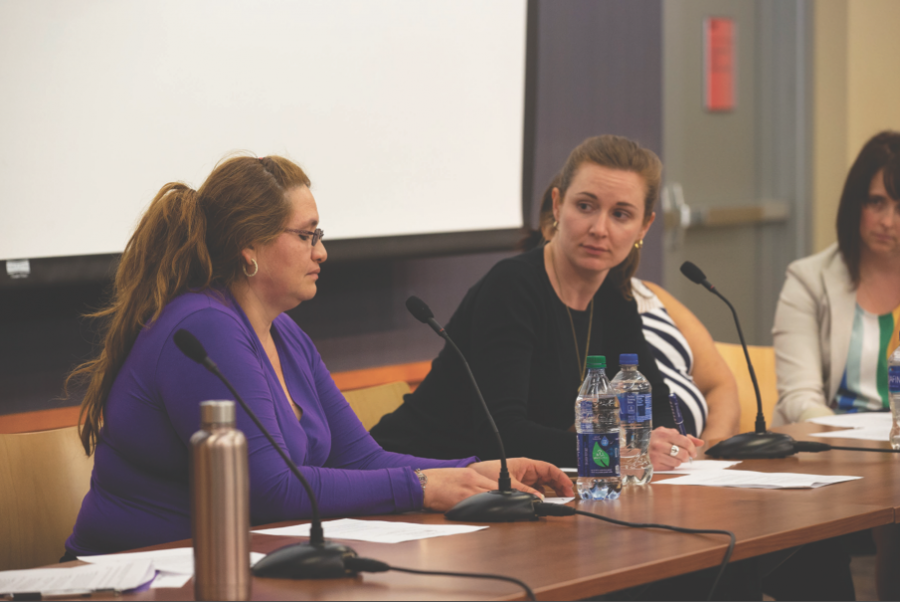Asylum seekers speak at panel
Legal scholars, asylum seekers, and human rights advocates delivered testimonials on Wednesday night at the Iowa City Public Library.
Honduran asylum seeker Rosalinda Velazquez tells her story of immigrating to the United States during the U.S./Mexico Border and State of Asylum Forum at the Iowa City Public Library on Wednesday.
April 3, 2019
Local people made their way to the Iowa City Public Library through the rain Wednesday night to hear stories of immigrants and their struggles.
The University of Iowa Center for Human Rights, the Drake University Legal Clinic, and the Iowa City Catholic Worker House hosted the panel “Stories from the U.S./Mexico Border and the State of Asylum Policy.” Panel members included asylum seekers, legal scholars, and human rights advocates.
Manny Galvez, a local journalist, activist, and Mexican immigrant, spoke about the role that American imperialism continues to play in Latin American countries.
Galvez specifically referred to an experiment carried out by the U.S. government in Guatemala in 1946. According to the National Institutes of Health, more 5,000 nonconsenting Guatemalan women were infected with bacteria that cause sexually transmitted diseases.
“When you read about these situations, you are going to realize that this issue didn’t just happen in Guatemala,” Galvez said. “It happened in the Dominican Republic, and Brazil, and Chile. Nobody wins in these situations.”
Attendees were shown a segment from a documentary by PBS “News Hour” about the gang violence that drives Honduran asylum seekers to leave their countries.
Honduran asylum seeker Rosalinda Velásquez was a small-business owner in Honduras until she and her husband were extorted by the gang members. Velasquez’s husband was murdered by gang members when they were not able to come up with enough money.
“The reason we left Honduras because my husband did not pay the amount that they demanded from him,” Velasquez said through an interpreter. “So when he died, I started my own business to support the family, and they started calling me and demanding the same amount of money from me.”
RELATED: Multimedia performance from UI playwright examines refugee crisis
The gang members told Velasquez that if she did not pay them the amount they demanded, they would kidnap her son.
Following the threat against her son, Velasquez and her family fled to México, where they remained for two months.
“When I went to Mexico, I wasn’t actually planning to come all the way to the United States, but my neighbors from Honduras said they were still coming to my house to see if I was there, so I shouldn’t go back to Honduras,” Velasquez said.
Rather than risk further harm by returning to Honduras, Velasquez and her two children swam across the border in order to make their way to Iowa City, where Velasquez had a sister.
Jaky Torres-Toro’s husband was murdered nine years ago in Honduras by members of Mara Salvatrucha, a gang known in the U.S. as MS-13. Her brother and father have also endured attacks from gang members.
“My dad got out of the hospital — he was severely injured. We were all back in the house,” Torres-Toro said. “On Oct. 17, we got a note that said we were going to have to leave. The note told us that we had 24 hours to leave … The note said we needed to get out of there because [the gang] was going to kill our entire family.”
Torres-Toro and her family immigrated to the United States in a caravan. They walked more than 5,000 kilometers to Tijuana before crossing the border to the U.S. Torres-Toro’s sister is being held in a detention facility by the border.
“We were fleeing,” Torres-Toro said. “I didn’t really have any idea where we were going.”






